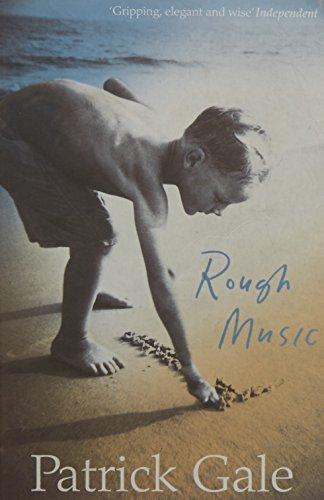
I first read this book decades ago and then in 2016 I discovered Patrick Gale again with Notes from an Exhibition (2007) and have remained a fan.
Rough Music (2000), like several of Gale’s novels, has a double narrative, same characters, same location, different times.
Julian a small boy, son of simple parents John and Frances, is taken on an idyllic beachside holiday in Cornwall with those parents, John and Francis. The widower, Bill, a writer, and child, Skip, of John’s sister arrive from America and cause passions and the status quo to collide.
Decades later, Julian is a grown man, a successful bookshop owner, and he returns to Cornwall for a holiday with his now ageing parents; his mother with early onset dementia, to the same beach and even, possibly, to the same house. The catalyst of drama and entertainment is that he has been having an affaire with his brother-in-law, Sandy, which began on the evening of Sandy’s buck’s party and has continued through Sandy’s years of happy marriage and the birth of his two sons to Julian’s sister, Poppy, and right up to the action of the story. No one, not Poppy or his parents, know about this. While on this holiday he meets Roly, an artist and drop-out, and he can see a possible exit from this family deception if only he can orchestrate it in time.
Some of the names of these characters change between narratives so don’t be put off by this. All will be revealed.
Each story is told in alternating chapters rendering the climax of both in close proximity to each other. A double whammy for the reader.
Gale is at his best with family relationships and spends time painting them in all their complex layers of expectation, disappointment, and flowering moments of joy. He is a wise writer, or perhaps just acutely observant.
Family life:
The only real difference was children. He had never appreciated until now how much emotional clamour, interference almost, the presence of children set up, saving a relationship from listening to itself.
How children can get in the way:
‘Ma.’ ‘What?’ ‘Leave the door open this time.’ The open door was sobering, like having a dressing-gowned child bearing mutely indignant witness from the room’s corner.
Ageing:
It was as though the only acceptable way to face old age was in a spirit of glassy contemplation and composure, to become a fund of quaint old stories (so long as one did not repeat them too often), a calm old lap on which babies might be placed and an undemanding extra presence at a dining table.
Self awareness:
Perhaps John had been right and her surliness was simply muffled sorrow.
…flirting was a kind of knife sharpening for marriage.
And humour:
Tell me what you’re thinking. Trust me. I’m a novelist.
Sometimes while reading one can feel a ‘little jump’: when you read something that can chip ever so slightly at your suspension of disbelief but for the sake of the story, and your own enjoyment, you accept it, go with it. I think we readers do this a lot. It’s only after you put the book down, days or weeks later or when you’re telling someone about the book, that you may realise that, yes, that something doesn’t quite gel, some plot point or character trait doesn’t quite fit with what has been set up for us to accept. Don’t let this colour your view of the work or the writer adversely. It is caused, I believe, by us readers assuming that the universe of the book is exactly the universe of the reader; but this may not be the case. Of course, some books are written in a universe completely alien to the reader, Harry Potter, Lord of the Rings for example, but most books we assume are written in our own universe. As readers we will give ourselves far more enjoyment and commitment if we let the story be what it is and not what we might want it to be, even down to the small details of the narrative and characters.
If you know and like Gale’s work you have probably read this, if not then this, along with A Perfectly Good Man (2012), two of his best, are a good way to begin your Gale adventure.
I continue my quest to read and write about all of Gale’s work and having surmised that it is only during the winter that he writes, in the spring and summer he is far too busy (festivals, garden, cello, cooking …) these seasons give me time to catch up. He is so prolific: two books every three years on average. His last Take Nothing With You came out in 2018; I’m expecting a new one next year. No pressure Patrick!
You can buy the book in various formats here.

I’ve just reread this and am a great fan of Gale. The universe of the book may not be the reader’s universe – that’s a really interesting idea.
LikeLike
Thank you Christine. I’m usually surprised when readers assume that what is real in a novel is the same as their reality. I think it shows that some readers don’t understand how novels are created.
LikeLike
Pingback: A Perfectly Good Man by Patrick Gale (2nd reading) – Michael K Freundt